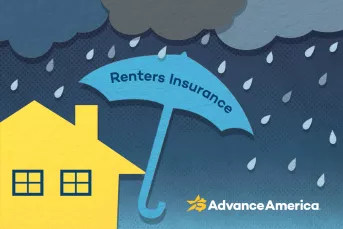
Debunking 11 Financial Myths
Financial myths can lead to unnecessary stress and poor decisions. By separating fact from fiction, you can make informed choices and achieve better financial health and stability.
Let’s clear up these common misconceptions and empower your financial journey!
Myth 1: You should always avoid debt
You may have been taught that all debt is bad and should be avoided at all costs. This myth stems from the fear of high interest rates, potential default, and the stigma often associated with owing money.
Truth: Not all debt is bad
In reality, not all debt is detrimental. There are instances where taking on debt can be a smart financial move. The key is to differentiate between good debt and bad debt.
Examples of good debt vs. bad debt
- Good debt includes loans that can improve your financial future. For instance, student loans can lead to higher earning potential, and a mortgage can help you build equity in a home.
- Bad debt includes high-interest consumer debt like credit cards, which can quickly become unmanageable if used irresponsibly.
Understanding the difference between good and bad debt is essential for making informed financial decisions. By leveraging good debt wisely, you can invest in your future and enhance your financial well-being.
Myth 2: Renting is wasting money
You may have heard that renting a home or apartment is throwing money away since you’re not building equity as you would with homeownership.
Truth: Renting can be financially sound
Renting offers flexibility and can be a wise financial choice depending on your situation. It can free up money for other investments and save you from the costs of home maintenance and property taxes.
Factors to consider when choosing between renting and buying
- Location. In some areas, renting is more affordable than buying due to high property prices.
- Financial stability. Renting may be better if you don’t have a substantial down payment or if your income is unstable.
- Future plans. Renting provides flexibility if you might need to move for work or personal reasons.
Making the right choice depends on your individual circumstances. Weighing the pros and cons of renting versus buying can help you make the best financial decision for your lifestyle and goals.
➢RELATED: Need Help Paying Rent? 5 Ways to Get Rental Assistance
Myth 3: Credit cards are always bad
Credit cards often get a bad reputation for leading to debt and financial trouble due to high-interest rates and fees.
Truth: Credit cards can be beneficial
When used responsibly, credit cards offer numerous benefits, such as convenience, rewards, and the ability to build a good credit history.
Tips for using credit cards wisely
- Pay your balance in full. Avoid interest charges by paying off your balance every month.
- Monitor your spending. Keep track of your expenses to stay within your budget.
- Choose the right card. Look for credit cards with low interest rates, no annual fees, and rewards that match your spending habits.
Understanding how to use credit cards effectively can help you take advantage of their benefits without falling into debt.
➢RELATED: Personal Loans vs. Credit Cards
Myth 4: Payday Loans are risky
Payday Loans are often criticized for their high-interest rates and short repayment terms, leading many to believe they should always be avoided.
Truth: Payday loans can be useful in emergencies
While Payday Loans can be costly, they can also provide quick access to cash in emergencies when other options are not available.
Tips for using Payday Loans responsibly
- Understand the terms. Be fully aware of the interest rates, fees, and repayment schedule before taking out a loan.
- Borrow only what you need. Limit your loan amount to what you can repay by the due date.
- Explore alternatives. Consider other options, such as an Installment Loan or borrowing from friends or family.
Using Payday Loans responsibly can help you manage short-term financial needs without falling into a cycle of debt. By understanding their terms and limitations, you can make informed decisions about when and how to use them.
➢RELATED: How Do Payday Loans Work?
Myth 5: Investing is only for the rich
You might believe that investing is a privilege reserved for the wealthy, requiring large sums of money to start.
Truth: You can start small
Investing doesn't require a large initial sum. Various platforms and options allow you to begin with small amounts, making investing more accessible than you may think.
Investment options for beginners
- Robo-advisors are online, automated platforms that create and manage a diversified portfolio for you, often with low minimum investment requirements.
- Fractional shares can allow you to buy portions of expensive stocks, letting you invest with as little as a few dollars.
- Employer-sponsored retirement plans can be a great way to start investing with small, regular contributions.
Even if you must start small, having the right tools and strategies and staying consistent with your investing can help you build wealth over time.
Myth 6: You don’t need an emergency fund if you have credit
You might think having credit cards or an open Line of Credit negates the need for an emergency fund because you can borrow money when you need it.
Truth: Emergency funds are essential
Relying solely on credit can lead to excessive debt and financial strain. An emergency fund provides a financial cushion without the drawbacks of borrowing.
How to build an emergency fund
- Set a goal. Aim to save three to six months' worth of living expenses.
- Start small. Begin by saving a small amount regularly, such as $20 per week.
- Automate savings. Set up automatic transfers to your emergency fund to ensure consistent contributions.
- Cut unnecessary expenses. Identify and reduce discretionary spending to boost your savings rate.
Building an emergency fund provides financial security and peace of mind. Having savings to fall back on can prevent the need to rely on credit in times of unexpected expenses.
➢RELATED: How Much Should I Have in an Emergency Fund?
Myth 7: Checking your credit score lowers it
A common misconception is that checking your credit will negatively impact your score, deterring many from monitoring their credit report.
Truth: It’s good to check your credit score
When you check your own credit, it doesn’t negatively impact your FICO credit score. In fact, experts encourage you to know your credit score and review your credit report at least once a year. It’s only when lenders check your credit for a loan or credit card application that your score may be temporarily affected. Here’s how to monitor your credit score:
- Use free credit monitoring services. Many financial institutions and credit bureaus offer free tools to check your credit score.
- Request annual credit reports. You're entitled to a free credit report from each of the three major credit bureaus once a year through AnnualCreditReport.com.
- Stay informed. Regularly review your credit report for errors or fraudulent activity and take action to correct any issues.
Monitoring your credit score is a crucial part of maintaining financial health. Regular checks help you stay informed about your credit status and take proactive steps to improve it.
Myth 8: You should pay off debt before saving
Many people assume it’s more effective to put any extra money toward paying off debt rather than savings.
Truth: Balance is key
While paying off debt is important, it’s also crucial to build savings simultaneously. Even a modest savings can prevent the need to incur excessive debt in emergencies.
Strategies for saving while repaying debt
- Create a budget. Allocate a portion of your income to both debt repayment and savings.
- Prioritize your emergency fund. Set an emergency savings goal and make it a priority in your budget.
- Try the debt snowball or avalanche method. Choose a debt repayment strategy that suits you while still setting aside money for savings.
- Automate savings. Set up automatic transfers to your savings account to ensure consistent contributions.
Balancing debt repayment and savings helps you manage your financial obligations while building a safety net. This approach ensures long-term financial stability and reduces the risk of falling back into debt.
➢RELATED: Should I Pay Off Debt or Save?
Myth 9: Budgeting is too hard
A lot of people assume budgeting is a complex and time-consuming task, making it difficult to start and maintain.
Truth: Budgeting can be simple
Budgeting doesn’t have to be complicated. With the right tools and strategies, anyone can create and stick to a budget.
How to create a simple budget
- Use a budgeting app to automate and simplify the budgeting process.
- Start with a basic template like a simple spreadsheet to track your income and expenses.
- Set realistic goals that are clear and achievable to help you stay motivated.
- Review and adjust your budget regularly to ensure it reflects your current financial situation.
By breaking down the budgeting process into manageable steps and utilizing helpful tools, you can easily create a budget that works for you.
Myth 10: You can rely on Social Security for retirement
Many Americans believe that Social Security benefits will be enough to cover their retirement expenses.
Truth: Social Security is not enough
While Social Security provides a crucial safety net, it’s not designed to be a sole source of income. For the average retiree, Social Security replaces approximately 40% of their pre-retirement income. This means you’ll need additional savings to maintain your standard of living.
How to save for retirement
- Calculate your retirement needs. Estimate how much you’ll need to live comfortably in retirement. Remember to factor in inflation and healthcare costs.
- Save consistently. Contribute regularly to your retirement accounts.
- Diversify your investments. Spread your savings across different types of investments to balance risk and growth.
- Consider additional income sources. Explore part-time work, flexible side gigs, rental income, or seasonal jobs to supplement your retirement savings.
By planning ahead and saving consistently, you can ensure a more secure and comfortable retirement beyond what Social Security alone can provide.
Myth 11: Young people don’t need life insurance
You may think that life insurance is only necessary for older people or those with children.
Truth: Early coverage is beneficial
Getting life insurance when you’re young and healthy can be a smart move. Policies are typically cheaper, and coverage can provide financial protection for your future family.
Reasons to get life insurance in your 20s or 30s
- Lower premiums. Younger policyholders generally pay lower premiums, making life insurance more affordable.
- Future planning. Life insurance can provide financial security for your future spouse or dependents, ensuring they’re taken care of if the unthinkable happens.
- Debt coverage. The right policy could help pay off debts like student loans, mortgages, or credit card balances, preventing them from becoming a burden on loved ones.
- Cash value growth. Some policies accumulate cash value over time, which can be borrowed against or withdrawn in the future.
Considering life insurance at a young age can be a smart financial move, offering long-term benefits and peace of mind.
Overcoming financial myths
Debunking common financial myths is essential for making informed decisions and achieving financial stability. By understanding the truths behind these misconceptions, you can take control of your financial future with confidence.
FAQs about financial myths
Why is it important to debunk financial myths?
Dispelling financial myths can help you make informed decisions, avoid costly mistakes, and improve their overall financial health.
How can I identify a financial myth?
Seek information from credible sources, consult financial advisors, and compare multiple viewpoints before forming an opinion.
Where can I find reliable resources for financial advice?
Turn to government financial education websites, non-profit organizations, certified financial planners, and reputable financial news outlets for credible advice.
What should I do if I need help with my finances?
It depends on your situation. You may need to use budgeting tools, attend a financially literacy workshop, consult a certified financial planner, or take out an emergency loan.
How often should I review my long-term financial plan?
Review your savings and investment plan at least once a year or whenever you experience significant life changes, such as a new job, marriage, or the birth of a child.
Notice: Information provided in this article is for informational purposes only. Consult your attorney or financial advisor about your financial circumstances.


